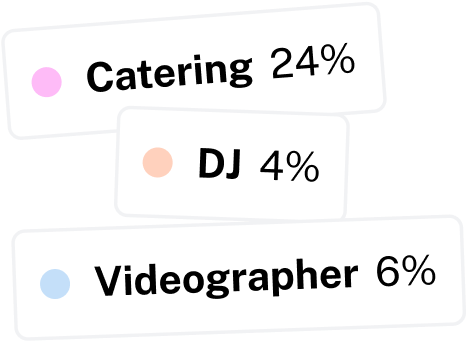Experts Dish: Here's How to Stick to Your Wedding Budget
It's easy to get carried away as you poke around Pinterest, where ceiling-spanning flower arrangements, lavish catering spreads and multi-day bashes are the norm. With that, feeling lost as you consider how to stick to your wedding budget is extremely common. Don't let these fancy wedding photos (conveniently shown without price tags attached) hinder you as you plan or make you feel bad about your budget. If you need some help, look to the advice below. These tips, tricks and strategies from two seasoned wedding planners are key to following your wedding budget breakdown. "Setting a wedding budget is crucial because it helps couples prioritize what's truly important to them," says Cameron Forbes, founder of Forbes Functions in New York, New York. "Weddings can quickly spiral out of control without a plan and a well-structured budget ensures that you're focusing your resources on the elements that'll make your day memorable."
1. Think of Your Budget as a Wedding Blueprint
"Think of your wedding budget as the blueprint for your wedding, just as a house has a blueprint before it's built," says Kisha A. Barnard, CEO and Founder of K. Barner Events based in New York and New Jersey and author of the wedding-budget ebook Back to Reality. "If you want a 3000-square-foot house, you'll need to see how that space is going to be divided up between all of the rooms. Think of your wedding budget the same way. Without establishing how much should be spent in each category, you'll be going in blind, acting on impulse and will likely go over budget."
2. Consider Hidden Wedding Costs and Extras
Take hidden wedding costs and extras into account when choosing vendors after you've determined your wedding budget. For example, if you've set aside $1000 for flowers, don't choose a florist who quotes you that exact number. Instead, choose a less-expensive florist where you'll have enough space to cover a tip any other additional costs that may arise.
If you suspect your wedding may run longer than the times you've specified in your vendor contracts, work overtime costs into your budget. Additionally, vendor tips can add hundreds to your wedding cost and they're required for everything from wedding dress alterations to welcome-bag delivery. (And, no, you can't skip tips, so factor them in from the jump.) You should also set aside some dollars for vendor trials as well as miscellaneous extras, like marriage license fees.
3. Use a Budget-Advising Tool
According to Forbes, consistency is key when it comes to sticking to a wedding budget and using an budget tool or spreadsheet is an easy method to keep up with your spending. The Knot Budget Tool is one such option that'll help you understand your wedding finances, with information on the average spend in your area per wedding category as well as suggested vendors that suit your desired spending level.
4. Hire a Wedding Planner
"Consider hiring an experienced wedding planner from the start," says Barnard. "A great planner will be able to advise you on how to allocate the funds you have, what's realistic, what isn't, help you with your venue search, assist with great vendor recommendations to ensure your money is going to the right people and more."
5. Include Wiggle Room in Your Initial Budget
Both Barnard and Forbes mentioned that they typically see couples go over their allotted wedding budget. One major culprit: not factoring in ample wiggle room. Forbes suggests allocating 10% of your overall wedding budget to play around with. This will come in handy for everything from unexpected wants to finding a dream vendor you'd like to splurge on.
6. Limit Your Guest Count
If you're finding it impossible to stick to your wedding budget, you're probably inviting too many people. Both planners cite a large guest count as a huge factor for couples overspending—the more folks you invite, the more you pay, so don't be afraid to trim your guest list. "Guest count is important because it determines how many people you have to feed, how many tables you'll need flowers for, how many rentals are needed, how many favors you have to give out and more," says Barnard.
7. Track Deposit and Payment Due Dates
Forbes suggests couples keep a current calendar tracking due dates for deposits and full payments. Otherwise, you risk getting hit with a hefty late fee that'll take a valuable chunk out of your wedding budget.
8. Do Your Research
Though it might be tempting to go with the first stationery designer that strikes you, it's worth shopping around a bit before you commit to a vendor. A little extra research could make a difference of hundreds of dollars, if you find a vendor that you like just as much as your first favorite for a lower rate. The Knot Vendor Marketplace has tons of vendors suitable for a range of budgets, so you can curate a team of pros that won't go over the average wedding cost.
9. Communicate as You Go
"I always advise couples to have open, honest conversations about their financial goals and limitations early on," says Forbes. "Discuss what you're willing to splurge on and what you're comfortable cutting back on." These conversations should also be constant and flowing as you book vendors, run numbers and chat through how to stay on a budget for your wedding—not just during the initial money chat postengagement.
10. Own Your Budget
Barnard emphasizes that you should feel good about your budget, whatever it may be, and to put your blinders on as you book your vendors (aka: Don't speak with pros you know are out of budget). Forbes adds: "Stick to your vision and avoid getting swayed by extras or last-minute add-ons that don't fit your original plan. Remember that your wedding budget isn't just about limiting costs, but also about investing in the right areas to make the day meaningful. Focus on the elements that are most important to you as a couple and don't get caught up in trends or pressures from others."




























